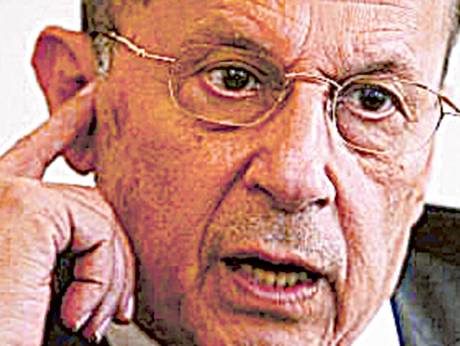Michel Aoun: On the warpath in Lebanon
June 01, 2015/Gulf News
Joseph A. Kechichian Senior Writer
War of words between FPM leader and defence minister as political stalemate continues
Beirut: General Michel Aoun on Sunday predicted the break-up of the Lebanese Armed Forces (LAF) if it did not mobilise against Islamist militants, allegedly entrenched in the northern Sunni stronghold of Arsal and the surrounding Lebanese border towns along the Syrian frontier.
Livid at being ignored by senior officials, including Prime Minister Tammam Salam and Defence Minister Samir Moqbel, Aoun unleashed his wrath against the armed forces and anticipated its destruction because its leaders were apparently reticent to deploy it where he wanted the LAF to make its presence felt.
“If the Army isn’t used” to subdue Arsal, said, “it will be like a kitchen knife that will eventually rust and deteriorate.” Ironically, he spoke in front of a minuscule audience of Zahle residents who visited him in Rabieh, and said that the military would “lose its role” in Lebanon if it doesn’t “liberate or contribute to liberating” Arsal.
Although the citizens of Arsal have consistently backed the LAF and called for its commanders to do what they deem is in the best interests of the state, Aoun played the desk-bound general, as he called on Beirut “to liberate the outskirts [of Arsal] from the clutches of extremists.”
Aoun was parroting Hezbollah officials who itched for the LAF to open a new internal front that would mimic the June 2013 Abra attacks in Sidon, even if LAF Commander Jean Qahwaji was adamant not to repeat what was a mere tactical victory that became a second strategic blunder.
Hezbollah fighters deployed in Syria, more precisely in the Qalamoun area that abuts Lebanon’s eastern border, are looking for help as a number have fallen amid bloody clashes. In fact, there is a great fear that extremists from Daesh, Al Nusra Front and similar groups, will sweep through Lebanese Shiite villages along the border, which prompted Hezbollah chief Hassan Nasrallah to declare that his group would try and eliminate the militants if the Lebanese state failed to do so.
Aoun and his Free Patriotic Movement (FPM) members picked up the tempo although it was strange for a former commander of the LAF, someone who knew the institution’s strengths and weaknesses, to assail it with such fanaticism. In reality, and in addition to doing Hezbollah’s bidding, Aoun was on the warpath because Defence Minister Moqbel derided him last week stating that he would fulfil his duties without paying too much attention to what the general who deserted his troops in 1990 said.
Infuriated by Moqbel’s audacity, Aoun labelled the minister of being ‘ignorant’ of legal texts, asserting that the sitting minister “commits a lot of mistakes and we hope that he doesn’t go on like this and also that others don’t follow his [lead].” Earlier, Aoun called on Moqbel to resign if he was unable to appoint a replacement for Qahwaji, whose term expires on September 23, 2015. In the absence of a president of the republic, who would usually make security level appointments, the FPM insisted that the terms of senior officers should not be extended, even if the FPM deputies voted to renew their own mandates in parliament… twice.
The Aoun comments upset many Lebanese, many of whom support the LAF leadership. On Saturday, Raymond Eskander, a local engineer, donated a million dollars to a special army fund established to support the children of heroes who fell in Nahr Al Bared and other fronts. That contribution echoed loud and clear among those who mattered while political elites exchanged warped opinions about imaginary threats.






















